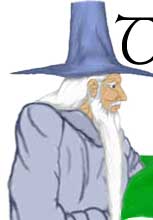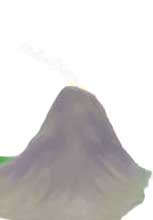



 |
 |
 |
 |

Bree
The Shire
Rivendell
|
Nyáréonié: The Fall of the North FrodoFriend « Back to Fan Fiction …Gone Awry Late in the night of that same day, two lone figures remained in the council room of Minas Hen, seated together at the eastern end of the great table. The bearing and face of one revealed him as Arvedui, while the bright eyes and grace of the other named him Thorondil. But they were not the same now as when hopeful councils had flowed during the sunlight; they seemed diminished without the presence and strength of their comrades. For they had come here for a council of their own, and dark words passed between them, and even their wise hearts were doubtful. A single lamp stood on the table, spilling light in haphazard patterns about the room. The white walls glinted dully under its yellow rays, but the maps covering them were but a vague dimness, and no stars could be seen through the windows. Empty chairs stood scattered about the table, their long shadows binding the room in a criss-crossing maze of dark and light that no eye could follow. The light reached timidly across the dark wood of the table towards the two seated, brooding figures, illuminating their faces from beneath. But in front of Arvedui was a shadow that the little lamp could not brighten, heavy and mysterious in a cloak of night. Silence reigned for the moment, as Man and Elf wandered deeply in their own thoughts, each taking comfort in the other’s presence, but neither daring yet to speak their mind. Thorondil’s eyes shone steadily with the unquenchable fire of spirit, flaming and dancing in him now though he did not move and did not betray his unrest by any other sign. But Arvedui’s eyes were downcast, and darkness was on his face, and he sat still as a statue. So it was the Elf who spoke first. “I do not wish to do this,” he said, soft voice filling the silent room like the distant drip of water in a cave, “It can lead to no good, no matter what you think. Nor am I certain there would be any result at all. Why should I succeed where you yourself failed?” Arvedui raised his gaze from his hands, resting white and still on the table next to that invisible darkness that the light did not touch. He looked at Thorondil, on whose face the beauty and wisdom of the Eldar shone unceasingly, and who was untouched by age and unfazed by sorrow. “Friend,” he said in barely more than a whisper, so that his voice did not echo in the empty space around, “I have looked into the Seeing Stone and it shows me only darkness. But not empty darkness. He is there, and ever he grows, filling my sight and my mind. I cannot see his thoughts, but he suspects mine. He was a Man once, I think, and he knows our kind; he can twist and shroud the truth for my eyes until I cannot tell what is the lie and what the reality. But you are an Elf, and great among your people, and my friend of many years. So I bid you look, and tell me what is revealed to you from the depths.” “And you do not know what you ask,” Thorondil replied, “Ah, Arvedui! Do you remember when you came to the Western Woods as a young man and saw the Sea for the first time? Do you remember what you asked me, there on the sands with the waves lapping at our feet?” Arvedui stared into the lamp, its madly dancing flames mirrored in his eyes. Then he said: “Why do you stay upon this shadowed earth? Why do you not go to the home of the Gods beyond the roaring seas, away from the curses and troubles of Men? And if you wish to stay, why do you not destroy the Dark One?” “Yes,” Thorondil said, “So you wondered, and though I spoke then of the fate and the sorrow of the Elven people, yet my words fell to nought. Thus I answered, and now I answer once more: We are bound to this Middle Earth by blood and doom, and though my people were indeed the First and dear to the Valar, given the gift of passage to that land at the end of days, yet we are not Gods. Even in the days of the glory of the Elves we could not end the reign of the dark powers. Now our strength and wisdom fails and our people diminish, and the day of Man comes. I am an Elf, but I cannot stand against the Witch-King’s will, though he be of mortal origin. I fear him, Arvedui; the power of his dark master is in him and he is strong. If I look into the palantír and meet him there, he will overpower me. I fear that darkness! I do not wish to wander lost under his spell, a slave to his merciless will!” “Such would not be your fate!” Arvedui replied, “For never would I leave a friend to helpless torment! But he will not see you. He cannot come close even to my mind, and you are an Elf, more powerful and more distant from him than I. Perhaps your keen sight can pierce the shadows and give us some hope. It is not easy to ask this of you, Thorondil! You know I love you as a brother, nor do the Dúnedain willingly share the secrets of the palantíri. And yet I ask it, in the name of our friendship.” Still Thorondil hesitated. The lightless shadow lay before them on the table like a hole in reality, the palantír that only its own fire brightens. Then finally he sighed. “It is against my better council,” he said, “But I will do this thing for you.” He leaned over the Seeing Stone, placing both hands upon it, one on either side, and looked into its hidden depths. A red light began to glow there as if from very far away, and it was mirrored in the Elf’s eyes. His gaze became intent and he stiffened, frozen, fair face pale but fringed as if with fire as the light of lamp and stone fell on him, mingling like two flames meeting.. Then suddenly his lips parted, and he cried out once in anguish or sorrow, wordlessly. Arvedui leaped to his feet, grabbing his friend’s shoulders. “Thorondil!” he called, “Come back! Do not look any more!” But the Elf did not move, only remained sitting, stiff and trembling with both hands pale upon the palantír, gaze and mind far off in a tangled dark maze beyond the reach of human voice. “O foolish weakness!” Arvedui wept, “What have I done? Thorondil! I have sent you into doom! Return to me, my friend!” He shook the Elf’s shoulders and tried to pry his stiffened hands from the dark stone. Suddenly, Thorondil blinked once. His palms remained rigid on the palantír, but he turned slowly to look up at Arvedui, who stood with his hands still on his friend’s shoulders, hardly daring to breathe. Their eyes met, and Arvedui gasped, but before he could speak or act, Thorondil, with a movement faster than mortal eye could follow, whipped around his arm and, with the stone in his hand, struck the king a blow to the head so that he fell without a sound to the floor.
Falathor did not step out of the shadow of the wall. He did not want to be seen just yet, so long as he had not been noticed. The courtyard was chilly, though the red-haired Man showed no sign of being bothered by the cold. Rose bushes ringed the still-green grass, and the pool in the centre reflected the night sky perfectly. Not only stars were mirrored in the dark water; a beautiful maiden wavered there. She was tall and slender, white-skinned, black-haired, blue-eyed. Her robe, too, was of pale blue, falling in silken folds to her silver-shoed feet. Her face was turned away from Falathor, but he did not have to see it; he knew every curve of delicate bone and inch of soft skin by heart. She gazed at herself in the still water, turning this way and that, watching her reflection. Then she smiled and twirled once in a circle; and as she did so, her gaze fell on Falathor. She gasped in surprise and took a step backwards. “Good evening, Indithel,” Falathor said from the shadows, “It has been a long time, hasn’t it?.” “Falathor!” Indithel said, a smile of delight lighting up her face, “How wonderful to see you!” “I could say the same,” said Falathor. Indithel blushed. He wondered why. Everyone who saw Indithel exclaimed about how glad they were to see her and how beautiful she was - she should be used to it by now. “Have you come from the Council?” she asked and when he nodded, continued excitedly, “What did they say? What will Father do? And what about Lomion? Oh, we were so worried about you two …” “What?” Falathor asked, shocked, “You know about Lomion? How did you find out?” Indithel looked crestfallen. “Oh, no,” she said, “I was supposed to keep it a secret. How silly of me. Please, don’t tell anyone! They’ll be so angry. I’m not supposed to know things. It’s rather unfair, if you ask me – why shouldn’t I know as well? And why are you hiding over there in the dark? Come over so we can speak properly!” Falathor stepped out of the shadows, and Indithel’s eyes flew open in shock. “Gracious!” she exclaimed, covering her mouth with a delicate hand, “Your eye!” She pranced gracefully over to him and took his head in her hands, turning it this way and that. “Was it…?” she asked tentatively, “Did he…?” “It was, and he did,” Falathor answered, “This is my dear brother’s work – only a small part of it, since you seem to know about the rest anyway. How did you find out?” “I have my ways,” Indithel said with a mysterious smile, “That patch does suit you rather well. You look quite the rebel now. I like it.” Falathor would have rolled his eyes, but since he no longer possessed them in the plural, he had to settle for rolling his eye. The King’s daughter was so empty-headed at times that he wondered why he was so madly in love with her. It was really intolerable, but he couldn’t help it. But no, he decided immediately, she wasn’t really empty-headed. Indithel was quite clever when it came down to it. In fact, he often had the feeling that she was merely playing a game of some sort, but with whom and for what reason remained mysteries to him. Perhaps she really was just a pampered princess who had never had to think for herself … but Falathor had a feeling that there was something beneath the surface. Sometimes feelings like that bothered him, and they were usually right. He had come here because something else had been bothering him. He had not wanted to believe what Lomion had said – that Indithel loved him. The very thought made him rage inside, though an observer would not have seen anything of his feelings expressed on his face. But not knowing the truth was even worse. He had to ask, no matter how melodramatic the following scene was likely to be, what with Indithel’s characteristic overreactions. Falathor hated melodrama. So he tried to phrase his question as mildly as possible. “Speaking of my brother,” he said, “I have a tiny question to ask.” “Ask away!” Indithel said, smiling sweetly, “I live to please!” “Lomion mentioned that the two of you had met when he was last here. He made some … interesting comments about your behaviour towards him. I was rather surprised by what he said, and thought I would ask your opinion on whether there is any truth in the matter.” “Oh?” said Indithel innocently, “What did he say? I’m really quite curious!” “Basically something along the lines of … that you pledged him your love and loyalty,” Falathor said in a rush. Outrage flooded Indithel’s face. He winced. So much for mildness … “And no doubt you believed him?” the princess snapped, “Just like that, eh? Well, thank you very much for your confidence! I have never been so insulted! I wouldn’t have believed it of you, Falathor! Why, I should, I should …” “Please, spare me the tantrum,” Falathor said, “All I want to know is if it’s true. Yes or no. Well?” “Why should I answer you?” Indithel smirked prettily, “I find it much more amusing to leave you in doubt. For that matter, why shouldn’t I consort with whomever I please? You don’t have any right to accuse me and make me feel guilty, even if I do hold your brother in high regard!” “But you don’t, I presume?” Falathor asked hopefully. “Maybe I do and maybe I don’t.” “Now you’re only sulking,” Falathor said, “It’s most unbecoming on a maiden your age.” For a moment, a strange expression crossed Indithel’s face. She still looked angry, but hurt and somehow bitter as well. She opened her mouth as if she meant to tell him something, but snapped it shut a second later without a word, folding her arms defiantly. “And how might it concern you?” she asked finally, “Why do you care?” “Why do I care?” Falathor said slowly, “Do you need to ask? Think, Indithel! Or if you cannot do that, feel! Can you not see it in my face? Look, and you will have your answer!” “All I see,” Indithel replied stubbornly, “Is an uncouth oaf who thinks Middle Earth exists merely for his pleasure. I do not want to talk to you anymore. Leave me now!” “Very well,” Falathor said, suddenly angry. He clenched his fists and glared down at her. “Very well. I am going to Tharbad. I don’t know when I will come back, if ever, but I can assure you, I won’t hurry back to you!” He spun around and stalked furiously out of the courtyard, muttering vaguely under his breath. Indithel did not move for a while, until she was sure he was really gone. Then she slumped and closed her eyes. Her legs did not seem to hold her anymore; she sat down on the grass in the silent courtyard. She covered her face with her hands, and her slim shoulders shook silently. A breeze wafted by, passing softly over the bare spot of earth next to the pond, where the White Tree of Arnor had once bloomed, long years ago. But the Tree had rotted from within and died, and the only brightness left in the courtyard was the silent form of the weeping maiden. “Indithel?” a voice called suddenly from somewhere not far away. Indithel started up in surprise. She scrambled to her feet, brushing the grass and dirt off her dress and scrubbing her face to remove all traces of tears. Then she smiled perkily and skipped of toward the sound of the voice. “Coming, Ravenna …!”
“You’re going where?” Anna cried, her voice rising to a shriek, “You’re doing what? Why?” She had invaded Trotter and Bronweg’s room, and stood there now with arms hanging loosely at her sides and an expression of utter stupefaction on her face. Trotter cringed. He was facing her with his back to the window, and Bronweg was leaning against the wall next to the door opposite him, arms folded and looking very amused. “You don’t have to go with us if you don’t want to,” Trotter said apologetically, “We’d thought you’d want to come, but I guess we should’ve asked … You didn’t want to come to the council, so … er, things sort of got decided like that.” He finished lamely. Anna had not been overjoyed when he told her of his decision to go to Gondor on behalf of King Arvedui of Arnor, but his attempt at reconciliation now only seemed to make her even angrier. “Oh, I see!” she hissed with narrowed eyes, “Not only do you go and decide for me that I’m going on a long and dangerous journey without asking, now you want to leave me behind too! Well, let me tell you, Trotter the Half-witted, you can’t just make my choices for me like that! I’m going with you whether you like it or not!” Trotter blinked. Something about that hadn’t seemed quite right. Behind Anna, he could see Bronweg, his shoulders shaking with silent laughter. The Elfit had his arms wrapped around himself and was apparently having trouble standing. Trotter didn’t find the situation all that funny. Nor did Anna, apparently, for she spun around to face the Elfit and if anything seemed to become even angrier, bristling with rage. “And you!” she said, “What are you laughing at? You think wandering leagues through the wilderness with starvation in front and hungry wolves behind is going to be amusing? You think you are both going to be big heroes? And what is all this troth-brother business?” “A custom among civilized people,” Bronweg replied mockingly, “Generally considered to be both honourable and polite. I am sorry we couldn’t let you in on it – it is generally considered a thing for men, thus troth-brother. But if the Lady truly wishes it, I could take her as my troth-fool. The Lady would look excellent in a four-pointed hat.” “You won’t be so cocky once we get to the Minhiriath,” Anna replied bitterly, “I have seen it; I went there sometimes before I left Tharbad. It is a wilderness, untamed and pathless, filled with strange creatures.” “Such as yourself?” Bronweg suggested, “If you are the worst Minhiriath has to offer, I think we will manage. While we’re on the subject, why did you leave Tharbad?” But at this Anna clamped her mouth shut and refused to say another word, sitting huffily down on Trotter’s bed with her arms folded in disapproval. Trotter took a breath, hoping that the storm had passed. He really felt rather guilty for involving Anna in their journey, but on the other hand he did not want to go without her either. He had grown very fond of his odd, outcast, embittered and shy, but secretly gentle and loving companion. He supposed it was selfish; Anna would be much safer in Fornost or in the Shire, or basically anywhere but with them. On the other hand she would be much unhappier in those places without them, or so his heart told him. “If you do indeed wish to come with us,” Trotter said, “I gladly welcome your company. In fact, I ask for it. It would not be the same travelling without you! We will go by horse, quickly and quietly, and perhaps it will not be so dangerous as you think. Hopefully our journey will be unnoticed and uneventful, and if we succeed all of Arnor will be saved for certain. You know that is why I have to do this, or at least attempt it.” After a moment, Anna sighed but nodded, if reluctantly. “You are taking unfair advantage of my unreasonable affection for you,” she said, “But I suppose you do need some one who has a whole wit on a quest like this. You and Bronweg together couldn’t fill a thimble when it comes to common sense.” “Exactly,” Trotter said amiably, relieved that Anna’s anger had abated somewhat, “Who else could fill us with such pure joy with her mere presence?” His grin faded as Anna glowered at him. “Now you are just humouring me,” she growled, “You’re a sneaky, cunning little creature and not half so innocent as you look.” Trotter shrugged, trying to look innocent. “So that’s agreed,” Bronweg said, sounding mostly amused as usual, “We will be leaving in a few days, I presume, and I -” but whatever Bronweg was going to say next, he was interrupted by a voice from the door. “I am afraid in a few days it will be too late! Things have taken a dark turn, and your departure must be hurried. We have been found out.” Falathor came striding quickly through the door to Trotter’s side; it was he who had spoken. The Man had obviously been running. He was breathing quickly and his face was flushed. He also looked rather upset - the glance he cast on Trotter was dark with anxiety and excitement. But it was not this that made Trotter stare at him in surprise. For Falathor carried in his fist a naked blade, against all custom and courtesy. And following him came the tall young man Trotter knew to be Aranarth, son of Arvedui. “Trotter, my friend, you must leave now, at this very moment if possible,” Falathor said, “Or I fear you may never depart at all, save to a country far more distant than Gondor, and from which no traveller may ever return – and the rest of us will in all likelihood join you there all too soon.” “What?” Anna cried, “We cannot leave now! Nothing is prepared! You cannot expect us to run out into the night without provisions, without travelling gear, without taking council or even looking at any maps, on the path of at least a month-long journey!” “And yet you must go,” said Aranarth from the doorway. He spoke calmly and did not seem upset or out of breath like Falathor. He was much like his father, Trotter thought, and yet not so; younger and fresher, with a light dancing in his eyes that had long been darkened by sorrow and despair in those of Arvedui. “The situation is changed. My father has been attacked. He was closeted with Thorondil alone in the Tower of Sight, and commanded that none should disturb them. But I was troubled and wished to take council with him myself; for the desire had awoken in me to go with the company of the Calacolindo to our sister kingdom in the south. When I was walking up the stairwell to the council room, I heard a strange and terrible cry, full of fear and pain. It was not the voice of my father, but it struck me with dread, and I ran up to see what had come to pass. On the floor I found Arvedui, unconscious and wounded, and of Thorondil there was no sign. My father was attacked, and what has become of the Elf, I do not know.” “But who could have done such a thing?” Trotter asked in shock, “Were there not guards in the tower? How could a servant of the Enemy have come there?” “And how could he have escaped?” Bronweg added thoughtfully, “I saw only one doorway to the room today, and unless there is a secret entrance, anyone fleeing would have been seen by Aranarth.” And he bowed to the king’s son as he spoke his name. “No one I know of can answer these questions,” Aranarth replied, “Save perhaps my father himself, when he awakes. Gandalf is with him now, and perhaps with his power and wisdom he can recall him to wakefulness. But it cannot be hoped now that our plans remain secret. He now knows of the messengers, of their number and of their path. If you wait, you will find your road barred by the creatures of the Witch-King. Hope now lies in speed and secrecy; all three of you must disappear into the wilderness beyond discovery.” “And yet we will be discovered in the end,” Anna said, “We are departing unprepared, and we will have to obtain provisions from somewhere. The wild lands do not offer much in this season, and even less to those who must hurry.” “Fear not!” Aranarth said, “You words hold wisdom – but all has been arranged. Your horses have been saddled and provisioned and await you now. We do not have time for further counsel. Farewell then, and go swiftly!” He disappeared back out the door, the sound of his steps fading quickly. “Come,” Falathor said, “I will lead you now.” And, taking only his sword and his father’s brooch, Trotter wrapped the his cloak about him and followed Falathor. Behind him came silently Bronweg with his great bow on his shoulder, buckling his quiver to his belt, and Anna, who bore no weapon and took nothing beyond the Starflower which rested as ever about her neck. They slipped into the corridor, and to any watcher it might have seemed that Falathor walked alone, for the three shapes behind him faded into the walls and stepped so softly that no sound could be heard. They met no one in the halls, and soon came to the doorway leading into the western courtyard. When they stepped outside the cold night air greeted them and the familiar stars shone overhead. Three tall shadows became, on closer inspection, their nervous horses, snorting and stamping impatiently. Trotter was glad to see that Dapple was to be his mount again; the tall horses of Men were not very much to his liking, despite their strength and speed. Quickly they climbed onto their horses. “Farewell!” Falathor said, “Follow the road straight on from the gate. You will come to a small guarded doorway, where you will be allowed to pass without trouble. Do not tarry on the road! I wish you luck, for all of our sakes!” He raised one hand, barely visible in the dim starlight. But before Trotter and his companions could ride out of the courtyard, a voice called to them from the shadows of the castle. “Halt!” Trotter started in surprise, and Dapple pranced nervously. Falathor whirled around, looking for the invisible speaker. He did not have long to wait, for a shadow detached itself from the wall of the castle and stepped towards them. Trotter gasped in shock, for there in the faint light he recognized Thorondil, cloakless and dishevelled. The Elf walked as if in a dream, his feet noiseless on the paving stones. “Thorondil!” cried Falathor in joy, “Where have you been? We searched for you, but everyone had begun to fear the worst!” Then he fell silent, for Thorondil did not answer, only stopped and stood motionless, his face lifted to the sky. Sudden fear awoke in Trotter’s heart and he wished he were somewhere else. Something was wrong, and he was not sure he wanted to see what would follow. Falathor, however, ran to the Elf without a thought of caution and seized him by the arms. Thorondil’s gaze turned from the stars to light upon the Man, and Falathor saw in dismay that the Elf’s face was marred with tears, glimmering like dark jewels upon his fair face. His lips were twisted as if in pain, but he spoke no word. Then Trotter cried out and Dapple reared in panic, for like a bolt of lightning a dagger flashed in Thorondil’s hand, straight and fast as an arrow toward Falathor’s heart. Falathor shouted in surprise and tried to pull backward, too slowly. But at the last moment the Elf’s hand turned and he plunged the thirsty steel into his own flesh with a strangled sob. “Ah, Arvedui! Mornië lantëa!” he cried, and slumped weakly, to be caught in Falathor’s arms. Blood flowed quickly, pooling on the cobble stones. “What evil deeds does this night herald!” Falathor said, bearing up Thorondil’s limp body as best he could, “The Enemy’s webs snare us even in the stronghold of the West!” Then he turned briefly to Trotter and his companions. “Ride now!” he called to them, “Calacolindo! And look not back into failing hope!” For but a moment Trotter lingered, reluctant to give up this last glimpse of his friend and the strong fastness of the city. “Farewell, Farathor!” he cried finally, “May we meet again in happier times!” And he urged his horse forward, fleeing from Fornost in the dark of the night as he had from Bree but a week before, though this time he had two companions instead of one, and the road ahead was long and uncertain. In the dark of the early morning they left the city of Fornost and turned to the south and west, towards the Shire.
Falathor watched the three mounted forms disappearing into the night for only a moment; then, dismissing them from his mind, he lifted up the fainting Elf and carried him quickly back into the castle. His long legs ate up the yards in the halls and he found himself nearly running, for he was certain that if he did not hurry it might become to late. Once he glanced at Thorondil’s face, and one glance was enough. The Elf was pale as snow, and there were dark shadows around his eyes. Falathor could not tell if he lived, and he did not dare to stop and search for a heart-beat. He hurried on, up several stairways until he reached the King’s room. Guards flanked the door, but when they heard his name and saw what burden he carried, they allowed him to pass inside quickly. The door closed behind him, and he took in the situation in a glance. He was in the King’s chamber, a large and beautifully decorated room; Arvedui himself lay on the bed, motionless. By his side stood Aranarth and Gandalf, and Olin was seated not far away upon a stool. All three stared at him when as he strode to the bed and lay Thorondil down next to the immobile form of the King. “You have found him!” Aranarth cried. Then he saw the bloody tear in the Elf’s tunic and the wound underneath. “But who could do this?” “His own hand drove the blade into his breast,” Falathor replied, “But he was aiming for my heart at first. It was as if he were fighting a battle with himself. There is some madness at work, and I do not understand it!” “Madness indeed,” Gandalf said thoughtfully, leaning over Thorondil and laying his wrinkled hand upon the Elf’s smooth brow, “More likely some device of the Enemy. He has many ways of snaring the innocent, and even the strong may be caught in his traps.” Then Falathor saw something he had not noticed before. In Thorondil’s left hand, the one which had not held the dagger, was a dark stone clenched against his side, hidden until now by his cloak. Gandalf gently pried the object from the Elf’s hand, which fell laxly onto the coverlet. “The palantír,” the Wizard said, “Now perhaps this riddle may be answered! An assassin enters the Tower of Seeing undetected, assaults the King and spirits away an Elf Lord, escaping equally undetected despite the fact that the only exit from the room was at that moment watched. Then he somehow drives his captive to madness so that he attempts to take his own life, all without showing so much as an eyebrow anywhere.” “What answer do you find in that?” Aranarth asked angrily, weary with worry and doubt, “It is nonsense, and impossible! Speak clearly, Gandalf, for this is not a time for jest!” “I am not jesting,” Gandalf answered mildly, “Merely thinking. And I believe I have the answer indeed. Thorondil looked into the palantír. Why, I do not know, for it was a foolish move and I have never known him to be a fool. Whatever was the reason, he encountered there a power greater than himself, which forced his will into submission and controlled his actions. There are very few beings that can overcome an Elf, and I am afraid it is clear who this power was! Thorondil thereafter attacked Arvedui under direction of a darker mind. You did not see him, Aranarth, when you ran into the council room, because he is an Elf Lord and it is within his power to hide himself in shadows and become silent and nearly invisible. So the Witch-King knows of our plans, and he sent his snared tool on the trail of the messengers; he was directed to kill you, Falathor, and them as well, most likely. Luckily for you, the hearts of Elves are strong! I would say that Thorondil won his battle at last, though he could not stop his hand, only turn it upon himself. But soon he will tell us himself. The wound is not fatal, Aranarth, and I suggest you call for the healers again!” “There is no need,” Aranarth said, “I will see to it myself. My father keeps the athelas herb in his chamber, and I have already administered it to him. He sleeps peacefully and will soon be healed. Now we will see what the hands of the Dúnedain may work upon the flesh of an Elf!” So saying, he went to a stone table by the side of the bed into which a shallow water-filled basin was carven. There was a small pouch next to the basin, and out of it Aranarth took a small handful of leaves. As he cast them into the water, a smell filled the air, pure and refreshing, clearing Falathor’s mind of its worry and confusion, and he breathed deeply, feeling rested and strong. The king’s son quickly soaked a white piece of cloth in the now fragrant water and, returning to the bedside, began to minister to Thorondil’s wound. “Perhaps in the end it is all for the best,” Gandalf muttered as if to himself, watching as Aranarth worked, “He may have learned something from his contact with that sinister will, and every bit of knowledge is needed now.” Through the long hours of the early morning Aranarth tended the fallen Elf, and when the sun’s rays broke in through the window, Thorondil’s eyes opened, and he spoke aloud. Only three words he said, but these filled the hearts of all four listeners with dread so that even the dawn did not bring them hope. “They are lost.” Back to Fan Fiction | Back to Rivendell Tales | Rivendell Music | The Tolkien Trail
|

Fan Art
Fangorn
Grey Havens |